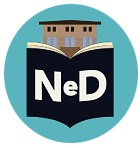Wildwords: From A-status to Zon
A student-generated dictionary highlights Northwestern’s unique vernacular
Some of the terms are familiar: “Dance Marathon” and “CTECs,” “South Campus” and “Weinberg.” Some are comical: “Nerdwestern” and “Wooshack.” And others are downright curious: “Libs” and “Sororotastic.”
They are all entries in WildWords, an online lexicon authored by students in Associate Professor Elisabeth Elliott’s annual “Making a Dictionary” class.
The course, taught in conjunction with Northwestern’s Multimedia Learning Center, challenges students to define Northwestern terminology and explore the University’s unique vernacular. Throughout the quarter, students conduct fieldwork to identify potential entries, update the style guide and improve the user interface.
For those who don’t already bleed purple, the project offers a crash course on Northwestern attitudes, humor and terminology. For the student lexicographers, the endeavor opens their eyes to the challenges of creating a dictionary from scratch.
It is a more complex task than one might assume, as students continually confront questions about inclusiveness, ethics, bias and the value of digital media versus print.
“Discussion and debate are constant,” Elliott says, “and students learn just how difficult this endeavor is.”
Now featuring more than 300 entries, the WildWords website invites visitors to indicate whether they’ve heard of each term, and if so, how often they use it.

Cognitive science and linguistics double major Sherry Vernon ’15 took the WildWords course during the last quarter of her senior year. To her surprise, she encountered slang terms for campus buildings, groups and clubs that she had not heard during her four years at Northwestern. Her preconceptions regarding language, she says, were challenged.
“It was fun to have people question my traditional ideas by asking ‘Why?’” Vernon says. “What I think of as ‘the golden rules’ weren’t always there. The language I use has been adapted continuously, and the timeline does not stop with me. That’s an idea that I don’t think I fully understood until sitting down with Professor Elliott and my classmates.”
That, says Matt Taylor, the Multimedia Learning Center information technology director whose team has helped Elliott design and teach the class, is among the project’s chief objectives.
“This course engenders so much conversation about ethics and community,” Taylor says. “It’s interesting to see how words have come and gone, what students see as controversial and the way this project formalizes what happens in subcultures on our campus.”
Back to top